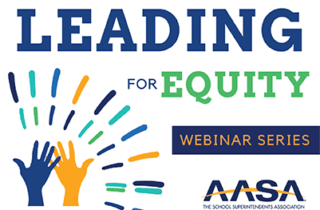When only 28% of a school district’s third graders are reading at grade level, changes are clearly needed. In the Aldine Independent School District just outside of Houston, Texas, the need for change resulted in a dual focus on improving the district’s leadership bench and revamping literacy instruction, in order to provide an equitable education for all students.
When addressing education inequity, it isn’t enough for superintendents and administrators to look at grades and attendance. They need to examine the social, legal, and economic factors that have supported systemic racism. But more important, said Dr. Mark T. Bedell, Superintendent of Kansas City Public Schools (MO), in an edWebinar hosted by AASA, The School Superintendents Association and AASA’s Leadership Network, school leaders need to make noise and keep fighting for policies that will support change in their communities and schools.
Ways to move the process forward, communicate effectively, and achieve meaningful improvements were discussed during a recent edWebinar, hosted by AASA, The School Superintendents Association and AASA’s Leadership Network. The presentation featured Dr. Jeannie Stone, Superintendent of the Richardson Independent School District (TX), Carrie Breedlove, Principal of J.J. Pearce High School (TX), Katrina Collins, Principal of Skyview Elementary School (TX), and Toni Jackson, a teacher at Dartmouth Elementary School (TX).
The remarkable seven-year transformation of Compton’s schools was discussed during a recent edWebinar, hosted by AASA, The School Superintendents Association and AASA’s Leadership Network, featuring Dr. Darin Brawley, Superintendent of the Compton Unified School District, and Michele Dawson, Senior Director of Technology and Innovation of the Compton Unified School District.
Work on developing culturally proficient communities during the previous decade has now led to the creation of a professional learning program designed to increase equity and inclusion during the 2020s, in collaboration with the Michigan Association of Superintendents & Administrators.
The 2021 Driving K-12 Innovation report released by CoSN selected the most critical Hurdles (challenges), Accelerators (mega-trends), and Tech Enablers (tools) that school districts are facing with personalized learning, innovation, and digital equity. In a recent edWebinar, sponsored by ClassLink and co-hosted by CoSN and AASA, education leaders reflected on the challenges of the past year and the possibilities of the upcoming school year.
In a diverse school district with more than 20 schools and 23,000 students, providing an equitable opportunity for every student to learn and grow is not an easy task. The plan and process used to generate positive results in the Northshore School District (WA) were discussed during a recent edWebinar, hosted by AASA, The School Superintendents Association and AASA’s Leadership Network.
According to Dr. Tammy Campbell, Superintendent of Federal Way Public Schools (WA), working towards equity requires using the head and the heart. School leaders need to have the skills and understanding to understand and change educational systems, she said, but they must also have a passion for their community and the equity mission.
Being a teacher during a pandemic may seem challenging enough without taking on potentially divisive political and social issues, but for three teachers who were recently named the Teacher of the Year in their states, working on equity issues with their students is a crucial part of the job and well worth the effort.
The disruptions and changes during the past year have made a return to the industrial education model of the 19th and 20th centuries problematic for school districts committed to preparing diverse students for 21st century careers. Instead, a more innovative and agile approach is needed to help today’s wide range of students recover from the pandemic and achieve more equitable outcomes.



